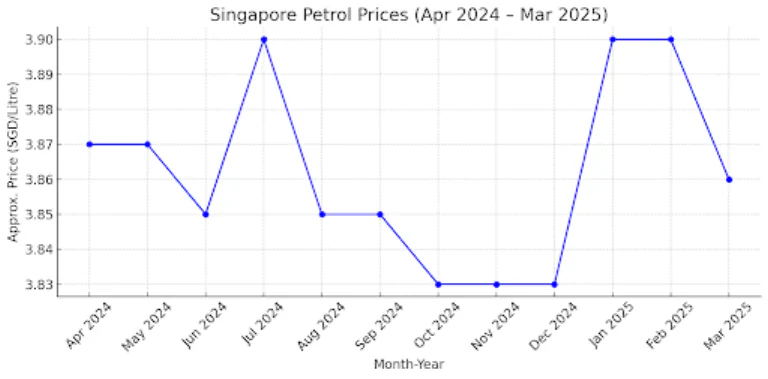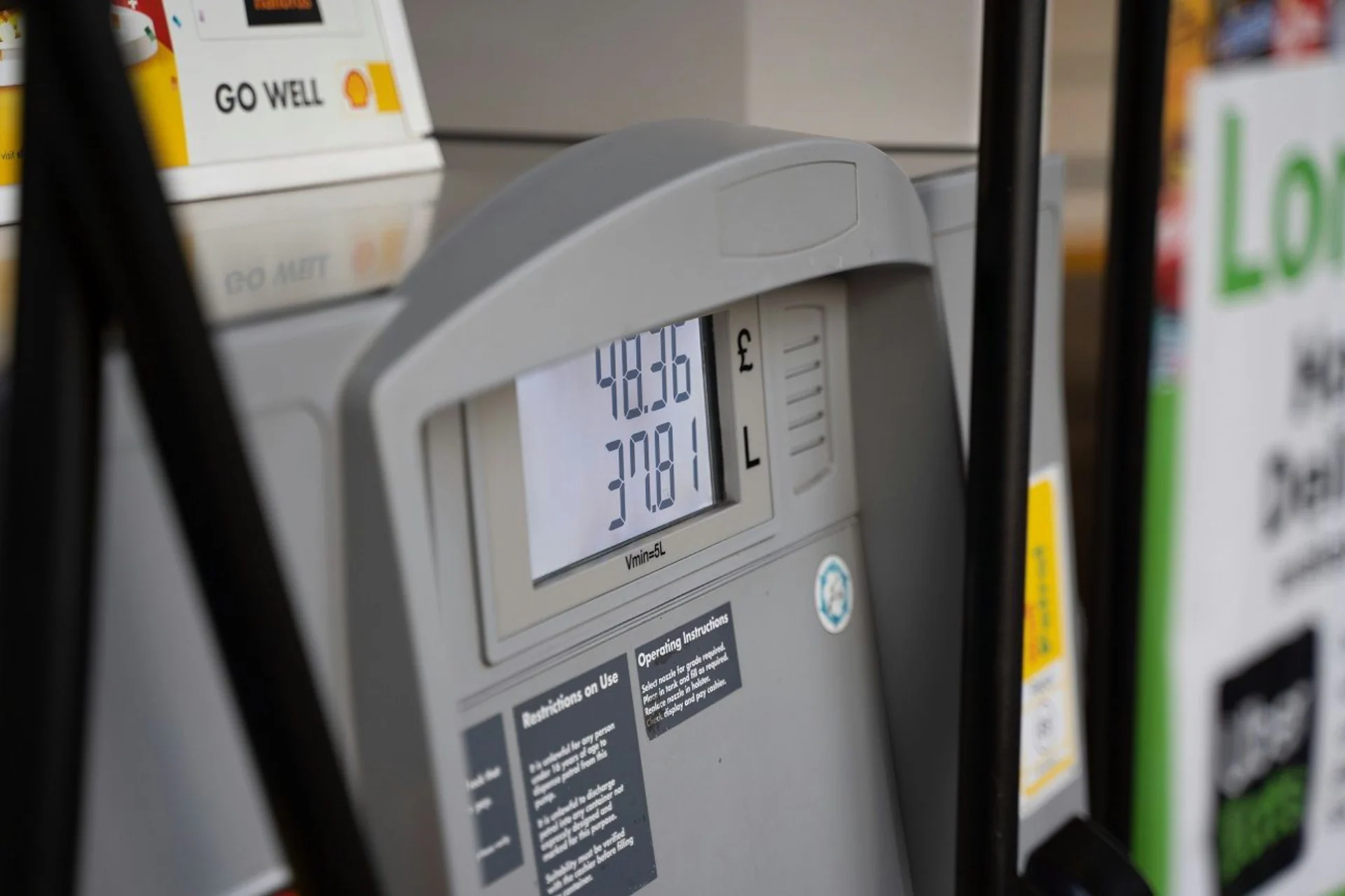Why Are Petrol Prices So High in Singapore?
Updated: 9 Dec 2025
Written bySingSaver Team
Team
The information on this page is for educational and informational purposes only and should not be considered financial or investment advice. While we review and compare financial products to help you find the best options, we do not provide personalised recommendations or investment advisory services. Always do your own research or consult a licensed financial professional before making any financial decisions.
Abstract:
-
Petrol prices in Singapore are high due to global oil prices, regional benchmarks (Mean of Platts Singapore (MOPS)), taxes, and currency exchange rates.
-
Expect prices to remain high in the near term.
-
You can save money by using petrol rebate credit cards, topping up midweek, joining loyalty programmes, maintaining your car, and driving smarter.
If you’ve filled up your tank recently and felt your wallet take a hit, you’re not alone. Petrol prices in Singapore are on the rise again, and it’s not just because of higher demand or oil prices.
From global market shifts to local tax policies, a mix of factors is fuelling the price hike. Here’s what’s going on, what it means for your day-to-day life, and how you can spend less at the pump.
Diesel vs petrol cars in Singapore: which will save you more in the long run?
Thinking of buying a car but can’t decide between diesel and petrol? We break down the cost differences so you can drive smarter.
What’s up with petrol prices in Singapore?
Petrol prices in Singapore have steadily risen over the past few months, with average rates hitting above S$3 per litre depending on the grade.

Source: TradingEconomics
Plus, it’s not just about how much oil costs. There’s more happening behind the scenes too.
What’s driving up fuel prices?
Local and global factors are working together to push up the price you pay at the pump.
Global oil prices are rising again
Oil is a globally traded commodity. So when supply tightens or demand spikes, prices jump—no matter where you live.
Here’s what’s been pushing prices up:
-
OPEC+ production cuts: Countries like Saudi Arabia and Russia have slashed output to prop up prices.
-
Increased global demand: More countries are ramping up travel and industrial activity.
-
Geopolitical tensions: Events like the Russia-Ukraine war and conflicts in the Middle East spook markets, which often means prices rise.
Even if oil isn’t scarce, the perception of risk can drive up prices. And since Singapore imports all its crude oil, we’re especially sensitive to global price swings.
Drive further, spend less: top fuel-efficient cars in Singapore
Fuel prices are climbing, but your petrol bills don’t have to. Discover the most fuel-efficient cars that give you more mileage for every dollar.
MOPS: The price benchmark we rely on
In Singapore, petrol prices are based on the Mean of Platts Singapore (MOPS)—a regional benchmark for refined oil products.
This means that even if crude oil prices fall, pump prices might not drop immediately if MOPS remains high. Why? Because MOPS also accounts for refining, transport, and operational costs in Asia.
Tariffs and taxes aren’t helping
The government imposes petrol duties to discourage excessive car use and reduce carbon emissions. While the goal is sustainability, it also means prices stay high even when global oil prices ease.
Here’s a breakdown:
-
Excise duty: Added directly to petrol, regardless of global prices.
-
Carbon tax: Recently expanded under Singapore’s climate goals.
-
GST (Goods and Services Tax): Applies to the total amount, including duties.
In Budget 2025, no new petrol duty relief was announced. So even as oil markets fluctuate, Singapore’s high baseline tax structure keeps pump prices elevated.

Currency exchange matters too
Oil is traded in US dollars. So when the Singapore dollar weakens, it costs us more to import oil—even if the USD price doesn’t change.
Right now, the Singapore dollar remains relatively strong. But if it slips, expect pump prices to follow suit.
Will prices go back down soon?
In short: not likely in the near term.
Singapore recently warned of a potential “tariff cascade” as the US ramps up trade restrictions on Chinese goods like electric vehicles and solar panels. While this doesn’t directly target oil, the ripple effects through global supply chains could increase volatility.
On the flip side, some analysts believe prices could ease slightly in the second half of 2025—if global production increases and demand softens. But don’t bet on big savings at the pump anytime soon.
Best Petrol Credit Cards in Singapore
5 smart ways to save on petrol in Singapore
Even if you can’t control the price per litre, you can still control how much you spend. Here’s how:
1. Use a petrol rebate credit card
Cards like the UOB One, OCBC 365, or POSB Everyday can give you up to 24% in fuel savings at select stations. Bonus: Some offer cashback on other everyday expenses too.
» MORE: Petrol rebate credit cards
2. Top up midweek
Prices tend to rise just before the weekend or public holidays. Tuesdays and Wednesdays are usually your best bet for lower rates.
3. Join station loyalty programs
Whether it’s Shell Go+ or SPC&U, loyalty points can translate into real savings over time.
4. Maintain your car
Simple things like keeping tyres properly inflated and servicing your engine regularly can boost fuel efficiency by up to 10%.
5. Drive smarter
Avoid sudden acceleration, remove excess weight, and plan your routes to avoid jams. Apps like Google Maps and Waze can help cut unnecessary idling.
Bottom line: Expect prices to stay high—and plan accordingly
Petrol prices in Singapore are shaped by forces far beyond our borders. While you can’t avoid paying duties or change global politics, you can make choices to soften the blow.
Taking small steps—like using the right credit card or maintaining your car—can go a long way toward keeping more money in your pocket.
» MORE: Check out the DBS Esso Card
About the author
SingSaver Team
At SingSaver, we make personal finance accessible with easy to understand personal finance reads, tools and money hacks that simplify all of life’s financial decisions for you.





